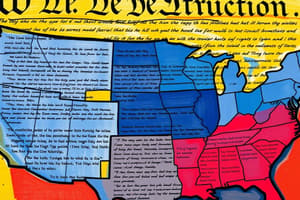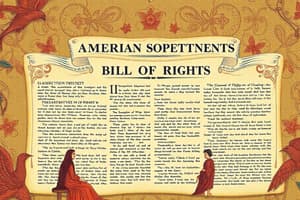Podcast
Questions and Answers
What is the supreme law of the land?
What is the supreme law of the land?
- Federal laws
- The Declaration of Independence
- State laws
- The Constitution (correct)
Freedom of religion means you can practice any religion or not practice one at all.
Freedom of religion means you can practice any religion or not practice one at all.
True (A)
What are the first three words of the Constitution that reflect the idea of self-government?
What are the first three words of the Constitution that reflect the idea of self-government?
We the People
The first ten amendments to the Constitution are called the ______.
The first ten amendments to the Constitution are called the ______.
Match the following to their definitions:
Match the following to their definitions:
How many U.S. Senators are there?
How many U.S. Senators are there?
A U.S. Representative is elected for a term of four years.
A U.S. Representative is elected for a term of four years.
Who becomes President if both the President and the Vice President can no longer serve?
Who becomes President if both the President and the Vice President can no longer serve?
The President's Cabinet primarily __________ the President.
The President's Cabinet primarily __________ the President.
Match the following U.S. governmental positions with their primary functions:
Match the following U.S. governmental positions with their primary functions:
Flashcards are hidden until you start studying
Study Notes
Principles of American Democracy
- The Constitution is the supreme law of the land, establishing and defining the government while protecting basic rights of citizens.
- The phrase "We the People" encapsulates the idea of self-government found at the beginning of the Constitution.
- An amendment refers to a change or addition to the Constitution.
- The first ten amendments to the Constitution are known as the Bill of Rights, which include fundamental freedoms such as speech, religion, assembly, press, and petitioning the government.
- The Constitution comprises twenty-seven amendments in total.
- The Declaration of Independence proclaimed the United States' freedom from Great Britain and emphasized the rights to life, liberty, and the pursuit of happiness.
- Freedom of religion allows individuals to practice any faith or choose not to follow a religion.
System of Government
- The economic system in the United States operates on a capitalist and market economy model.
- The rule of law requires everyone, including leadership and government, to adhere to the law, ensuring no one is above it.
- The government is divided into three branches: legislative (Congress), executive (President), and judicial (the courts).
- Checks and balances serve to prevent any one branch of government from becoming too powerful, alongside the separation of powers.
- The President heads the executive branch and is responsible for implementing federal laws.
- Congress, composed of the Senate and House of Representatives, is responsible for creating federal laws.
- The U.S. Congress is bicameral, divided into the Senate (100 members, serving six-year terms) and the House of Representatives (435 voting members, serving two-year terms).
- Each U.S. Senator represents all the people of their state, while the number of Representatives per state is determined by its population.
- Presidential elections are held in November, with a term length of four years for the President.
- In the event the President cannot serve, the Vice President assumes the role, followed by the Speaker of the House if both are unable to serve.
- The President serves as the Commander in Chief of the military, has the power to sign or veto bills, and is advised by the Cabinet, which includes various Secretaries such as the Secretary of State, Secretary of Defense, and others.
Studying That Suits You
Use AI to generate personalized quizzes and flashcards to suit your learning preferences.




